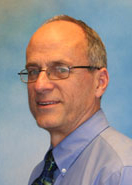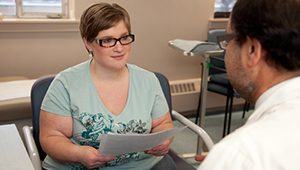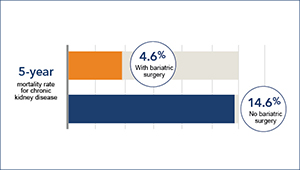Obesity
Research overview
“Obesity is the number-one health problem in the United States because it negatively affects our population’s health more than any other condition,” said Kaiser Permanente Washington Health Research Institute Senior Investigator David Arterburn, MD, MPH. Kaiser Permanente Washington researchers are doing practical research to learn how doctors, patients, families, employers, and policymakers can best work together to prevent and treat obesity.
“We’re focusing on three ways to halt the obesity epidemic,” said Senior Investigator Dori Rosenberg, PhD, MPH. “We’re helping to change obesity-promoting environments, bringing evidence-based prevention and treatment programs into health care systems, and helping people develop lifelong healthy diet and activity habits.”
Kaiser Permanente Washington obesity research areas include:
- reducing sedentary behavior and promoting physical activity and healthy diet in various age groups, populations with chronic conditions, and families;
- shared decision making to help patients find the best way to a healthy weight;
- implementing health coaches in primary care to support behavior changes;
- social networks that support lifestyle change programs;
- relationships between medications and genetic factors in developing obesity;
- health system, community, and national policies that address obesity;
- relationships between obesity and depression, diabetes, and other conditions; and
- long-term benefits and risks of bariatric (weight loss) surgery.
“Obesity is caused by many factors, so at Kaiser Permanente Washington, we’re working on many levels,” said Paula Lozano, MD, MPH, a senior investigator and Kaiser Permanente Washington’s assistant medical director for preventive care. “We’re improving health care to help people who are obese now. But since obesity is a societal problem, we’re also studying how to change our homes and workplaces and neighborhoods to create more healthy environments.”
Recent publications on Obesity
Arterburn DE, Wellman R, Courcoulas A, Anau J, Hsu C, Tavakkoli A, Fischer GS, Ahmed B, Eavey J, Luce C, Williams N, Stilwell D, Paul K, Daigle CR, Elwyn G, McTigue KM Enhancing Shared Decision-Making in Metabolic and Bariatric Surgery: A Multi-System Implementation and Evaluation 2025 Dec;11(6):e70091. doi: 10.1002/osp4.70091. Epub 2025-12-05. PubMed
Hansell LD, Hsu CW, Mogk JM, Paz SR, Moore DD, Macias MM, Bhakta BB, Crawford CL, Ellis D, Lopez C, Jackson T, Graves R, Corralejo V, Gray MF, Young DR, Drewnowski A, Lewis KH, Murali SB, Coleman KJ Experiences and Perspectives of Racially Diverse Patients 5 Years Post-Bariatric Surgery: Qualitative Findings from the BELONG II Study 2025 Oct 16 doi: 10.1007/s40615-025-02635-y. Epub 2025-10-16. PubMed
Thapa B, Schmittdiel JA, Arterburn D, Neugebauer R, Dyer W, O'Connor PJ, An J, Cassidy-Bushrow AE, Gilliam LK, Hooker SA, Nolan MB, Oshiro CES, Thomas T, Simonson G, Dombrowski SK, Rodriguez LA Clinical and Demographic Characteristics Associated With Diabetes Remission in Six Integrated Health Care Systems: A Retrospective Cohort Study 2025 Oct;48(10):1737-1743. doi: 10.2337/dc25-0530. Epub 2025-07-30. PubMed
Sloan CE, Zepel L, Smith VA, Arterburn DE, Baecker A, Clark AG, Kawatkar AA, Kane RM, Daigle CR, Coleman KJ, Maciejewski ML Health Expenditures Decline After Bariatric Surgery for Patients With Type 2 Diabetes 2025 Sep;48(9):1502-1511. doi: 10.2337/dc25-0254. Epub 2025-06-12. PubMed
Sun S, Haneuse S, Levis AW, Lee C, Arterburn DE, Fischer H, Shortreed S, Mukherjee R Estimating weighted quantile treatment effects with missing outcome data by double sampling 2025 Apr 2;81(2). doi: 10.1093/biomtc/ujaf038. PubMed
Researchers in Obesity
 David E. Arterburn, MD, MPHSenior Investigator |
 Allen Cheadle, PhDSenior Investigator, KPWHRI; Senior Research Associate, CCHE |
 Andrea J. Cook, PhDSenior Biostatistics Investigator |
 Maricela Cruz, PhDAssociate Biostatistics Investigator |
 Nicole M. Gatto, PhD, MPHPrincipal Collaborative Scientist |
 Beverly B. Green, MD, MPHSenior Investigator |
 Mikael Anne Greenwood-Hickman, MPHSenior Collaborative Scientist |
 Paula Lozano, MD, MPHSenior Investigator; Director, ACT Center |
 Dori E. Rosenberg, PhD, MPHSenior Investigator |
 Gregory E. Simon, MD, MPHSenior Investigator |











